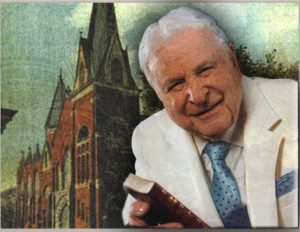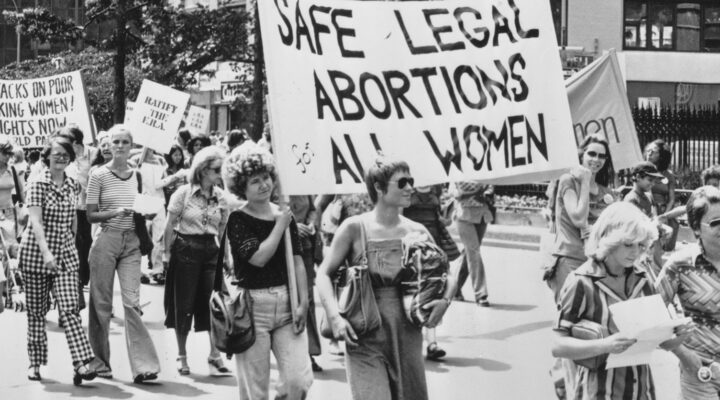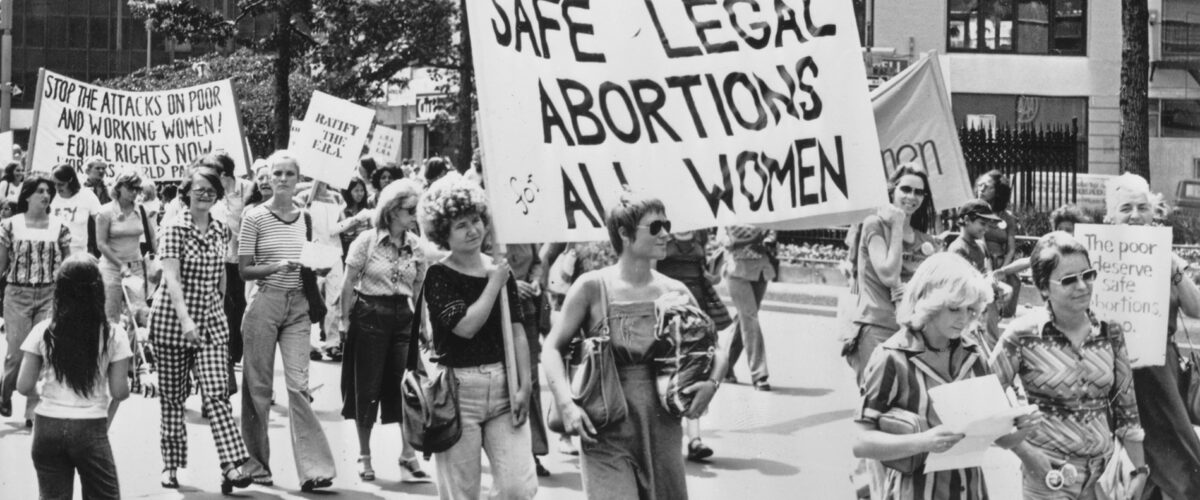The Supreme Court has voted to overturn Roe v. Wade, according to a leaked first draft majority opinion written by Justice Samuel Alito.
As an early draft, this opinion is not an official decision from the court, and abortion remains legal in all 50 states. However, while this opinion does not yet carry any legal consequences, this initial draft indicates it is likely that Roe v. Wade, which protects a woman’s right to choose to have an abortion, will be struck down in the coming months.

Laura Ellis
This comes on the heels of new, strict state legislation that severely restricts the right to an abortion in states including Texas, Oklahoma, Kentucky and Florida. Some of these laws, like the legislation in Texas, include a Wild West endorsement of vigilantes and bounty hunters pitting neighbor against neighbor.
Most of these state laws are near-total bans on abortion, in some cases, outlawing abortion after only six weeks of pregnancy. Basic education on menstrual cycles — something most male lawmakers, and men in general, seem completely ignorant of — tells us that many women are unaware they are pregnant at six weeks. And those who are aware only have a week or two to make the multiple necessary appointments and consult with their doctors, family members, clergy and other counselors to make this life-altering decision.
The last couple of years have been the worst years for the progress of reproductive health since Roe v. Wade in 1973, largely due to new state legislation. According to the Guttmacher Institute, 31 states have introduced new abortion bans in 2022 alone.
Before the leak of the Supreme Court opinion, this crusade against abortion existed primarily on the state level because Roe v. Wade set the federal precedent. Now, nearly 50 years after the landmark court decision, the question of reproductive rights again haunts the nation.
“What is now known as the Religious Right is well-recognized for its anti-abortion stance. However, this was not always the case.”
Abortion has become a divisive hot-button topic not only for politicians, but for voters as well, especially Christian voters. What is now known as the Religious Right is well-recognized for its anti-abortion stance. However, this was not always the case.
Origins of the Religious Right
Episcopal priest and American historian Randall Balmer explains the connection between abortion and evangelicals by detailing the true origins of the Religious Right. He claims that contrary to popular belief, the Religious Right was not birthed by a Christian outrage in response to Roe v. Wade, but rather a Christian outrage in response to segregation. The Religious Right aligned with the cause of illegalizing abortion years after Roe for the purpose of garnering political power for conservatives.
In the years following Roe, evangelicals were either ambivalent about abortion, claiming it was a Catholic issue, or they were in support of the Supreme Court decision.

W.A. Criswell with image of First Baptist Dallas behind him.
W.A. Criswell, former president of the Southern Baptist Convention and legendary pastor of First Baptist Church of Dallas, responded to Roe by saying, “I have always felt that it was only after a child was born and had a life separate from its mother that it became an individual person, and it has always, therefore, seemed to me that what is best for the mother and for the future should be allowed.” Criswell later changed his mind on this position.
Evangelicals first entered most prominently into the political sphere not in opposition of abortion but for the purpose of upholding segregation.
United around segregation
Following the Brown v. Board of Education decision in 1954, which claimed school segregation was unconstitutional, there was a spike in new private schools that only admitted white students. In 1969, a group of Black parents from Mississippi initiated a deep dive from the IRS into these private academies, claiming their tax-exempt status as charitable institutions did not align with the rampant racial discrimination of admission policies.
The conflict went to the Supreme Court, which ruled that schools with racially discriminatory practices of admission could not claim tax exemption. This prompted the IRS to take a closer look at similar practices in other private, predominantly Christian, schools of all levels of education.
Leaders like Paul Weyrich and Jerry Falwell were searching for a cause that would unite evangelicals, who up until this point were largely uninvolved in politics, to create a common and powerful political movement. They found that cause in school segregation.

Jerry Falwell gestures while talking with President Reagan after a candle lighting ceremony in support of prayer in schools on Sept. 25, 1982 (AP Photo/Charles Tasnadi, file)
Bob Jones University was one institution that refused to admit Black students, even after consequences imposed by the IRS. When Bob Jones lost its tax exemption due to its discriminatory policies, evangelical leaders were outraged.
They banded together to form an early version of the Religious Right — connected by their mutual hatred for governmental oversight that demanded the desegregation of Christian schools. Their primary purpose of upholding segregation was packaged with claims of religious freedom for private schools.
But outrage at desegregation did not incentivize everyday evangelical voters. And without the voters, it was impossible to create the kind of unified political movement Weyrich hoped to build.
Pivot to abortion
So the Religious Right pivoted to focus on abortion. They recruited Francis Schaeffer, who threatened Christians with the fear of “secular humanism” and a film series about the horrors and violence of abortion, featuring scenes of baby dolls littered across the Dead Sea. The film series was wildly successful, and by 1980 the Religious Right was synonymous with a powerful anti-abortion movement.
Seven years after Roe v. Wade was decided with little to no opposition from Protestants, a grassroots Christian political movement appeared in full swing. Their one litmus test to join the group and determine political alignment? Abortion.
Evangelicals initially aligned with an anti-abortion stance not to preserve the sanctity of life, but to gain political power. And I would argue that today the staunch anti-abortion movement from the Religious Right continues as the means by which conservatives retain incredible amounts of political capital masquerading as moral piety.
Yes, but …
Before you start drafting your hate mail, I’ll pause here to say that I know voters of all faiths have genuine, faith-informed moral concerns about abortion and are not casting votes for the sole purpose of bolstering conservative political power. However, the marriage between the Religious Right and anti-abortion activists was tainted from its conception, and it always will be burdened by the shameful fact that its union began not to support the sanctity of life but the sanctity of power.
“We can’t be so naïve to claim abortion bans are solely about preserving life or decreasing abortions.”
We can’t be so naïve to claim abortion bans are solely about preserving life or decreasing abortions. They’re also about expanding conservative power, packaged in the incredibly flashy goal of saving unborn babies.
Methodist pastor David Barnhart, wrote, “‘The unborn’ are a convenient group of people to advocate for. They never make demands of you; they are morally uncomplicated, unlike the incarcerated, addicted or the chronically poor; they don’t resent your condescension or complain that you are not politically correct; unlike widows, they don’t ask you to question patriarchy; unlike orphans, they don’t need money, education or child care; unlike aliens, they don’t bring all that racial, cultural and religious baggage that you dislike; they allow you to feel good about yourself without any work at creating or maintaining relationships; and when they are born, you can forget about them, because they cease to be unborn. It’s almost as if, by being born, they have died to you.”
One of the biggest critiques of anti-abortion activists’ “pro-life” slogan is that often these activists fail to support other political causes that preserve the life of the child after being born. Barnhart continues by saying the unborn “are, in short, the perfect people to love if you want to claim you love Jesus but actually dislike people who breathe. Prisoners? Immigrants? The sick? The poor? Widows? Orphans? All the groups that are specifically mentioned in the Bible? They all get thrown under the bus for the unborn.”
Barnhart’s words may seem to us unnecessarily harsh and cynical. But he’s pushing back against the narratives told by the Religious Right about abortion. It’s important to debunk these narratives, specifically the myths that abortion bans are about preserving life or decreasing abortion rates.
What’s to come
 In the fallout of this forthcoming Supreme Court decision, states will create restrictions and bans without federal oversight. Experts estimate that 26 states will impose abortion bans. Women in blue states and rich women in red states will continue to have access to abortions. However, impoverished women living in red states will struggle to afford and find reproductive health care.
In the fallout of this forthcoming Supreme Court decision, states will create restrictions and bans without federal oversight. Experts estimate that 26 states will impose abortion bans. Women in blue states and rich women in red states will continue to have access to abortions. However, impoverished women living in red states will struggle to afford and find reproductive health care.
This should come as no surprise, but overturning Roe will only exacerbate existing inequities, as bans and restrictions disproportionately affect women of color, women in poverty, young women and women in rural areas who have more difficulty accessing already limited medical facilities.
“Overturning Roe does not support life. It assumes that some life, some bodies, are worth more than others.”
Overturning Roe does not support life. It assumes that some life, some bodies, are worth more than others — that some bodies can and should be restricted, controlled and used at will.
This week, like many of you, I’m wholly disheartened by the refusal of safe and affordable access to reproductive health care that will most harshly affect society’s most marginalized women. I’m angered by the façade of the Religious Right, whose marriage with the anti-abortion cause was founded in a hungry grab for power. And I’m weary from listening to those who claim this overturned decision will protect life or lessen rates of abortion.
There are many valid and complex components to consider when weighing the morality of abortion. But if the moral goal is protecting life and lessening abortion rates, we must start with the data-informed realization that banning abortions does not lead to fewer abortions; it leads to fewer safe abortions and higher maternal mortality rates.
I am a pro-choice Christian for a number of reasons. And not least of these reasons is the reality that restricting and banning abortions does not work. I want to see a world with fewer abortions, and I believe the majority of people on both sides of this issue want the same thing.
“I want to see a world with fewer abortions, and I believe the majority of people on both sides of this issue want the same thing.”
If we really want to decrease abortion rates, we would increase funding for Planned Parenthood, improve access to birth control and more comprehensive sex education, create universal reproductive health care, overhaul foster care and adoption systems, instate paid maternity leave, subsidize universal child care and focus on ending sexual violence.
This is not to mention the myriad ways the church can stand in the gap and do its part to decrease unintended pregnancies and abortion — a movement that begins by dropping the ever harmful and deep-seated attitudes of shame about human sexuality. How beautiful would it be if women and girls viewed pastors as trusted advisers rather than harsh condemners in the face of an unintended pregnancy?
A lesson from the Clergy Consultation Service
This kind of care from pastors is not unprecedented. Before Roe and before the Religious Right took up the cause of abortion, Protestant ministers and Jewish rabbis created the Clergy Consultation Service on Abortion in 1967 as an underground movement to provide safe abortions for women and girls. The CCS included more than 2,000 religious leaders who counseled pregnant women and helped them find licensed medical professionals willing to perform legal and illegal abortions.

Arlene Carmen, Al Carmines, and Howard Moody circa 1975 (Courtesy of Judson Memorial Church)
In the 1960s, clergy saw the medical crisis facing women as well as the rising death toll as a result of abortions performed by unqualified individuals. Clergy noticed that women were traversing a world of secret messages and passwords to gain access to illegal health care with little to no assurance of safety or that the person conducting the abortion was a licensed professional.
So the CCS committed to walk with women through the process of abortion, from initial conversations with women, to in-person research of good doctors and medical facilities, to accompanying women safely to their appointments.
Living in the 21st century where evangelicals scream that the only religious view is that abortion murders babies, it was refreshing and almost a little alarming to read the ways these CCS clergy viewed abortion and considered it their God-given duty to confidentially and compassionately usher women safely through this experience.
“I never judged women for the reasons they gave for needing an abortion. Instead, I trusted women’s judgment and helped them find a safe place to terminate their pregnancy,” wrote CCS member and Presbyterian minister Carl Boaz.
One of the co-founders of CCS was Howard Moody, a Baptist minister from Judson Memorial Church in New York City, a church that still has Baptist alignments today. Regarding abortion, he wrote, “This example of severe sanction against women may have been understandable when men were convinced that women were witches and demons, but in the latter part of the 20th century, it is a cruel travesty on equal justice and a primitive form of retribution unworthy of both our theological and democratic traditions.”
Another CCS leader, Presbyterian minister Charles Landreth, said, “Whenever we try to make conditions for each other more human, we are engaged in a religious pursuit. Christians and the Christian church simply cannot turn their backs on the problem of abortion and the dilemmas which it creates.”
I couldn’t agree more.
“The church simply cannot turn its back on all the women who will be harshly and negatively affected by the Supreme Court striking down Roe v. Wade.”
Fifty years later, the church simply cannot turn its back on all the women who will be harshly and negatively affected by the Supreme Court striking down Roe v. Wade. As Christians we must try our best to create conditions for each other that are more human, more grace-filled and more hospitably Christ-like. In tandem with my faith, I hold to the belief that illegalizing abortion will not create these kinds of conditions.
In the coming months as states create new abortion restrictions and bans, the same kind of underground movement of women searching for safe abortions most likely will become a reality again. Will Christians accompany these women, echoing the compassionate care of the CCS foremothers and forefathers? Or will the loudest Christian response to abortion continue to be the Religious Right, shouting from their place of privilege, piety and power?
Laura Ellis serves as project manager for Baptist Women in Ministry. She is a former Clemons Fellow with BNG and previously served in ministry with Safe Havens Interfaith Partnership against Domestic Violence and Elder Abuse. She lives in Waco, Texas, and earned a master of divinity degree from Boston University School of Theology.
Related articles:
The Supreme Court’s politicized decision on abortion will do nothing to help churches thrive | Opinion by Mark Wingfield
Alito and public opinion reveal the link between Roe and a broader white Christian nationalist agenda | Opinion by Robert P. Jones
SBC calls for ‘immediate abolition of abortion without exception or compromise’
A leak: The truth of a sick nation | Opinion by Jamar A. Boyd II
To reduce abortion humanely and justly, people of faith should back the ERA | Opinion by Allyson Mckinney Timm and Meghan Tschanz
Racism and the evolution of Protestant support for private education | Analysis by Andrew Gardner


